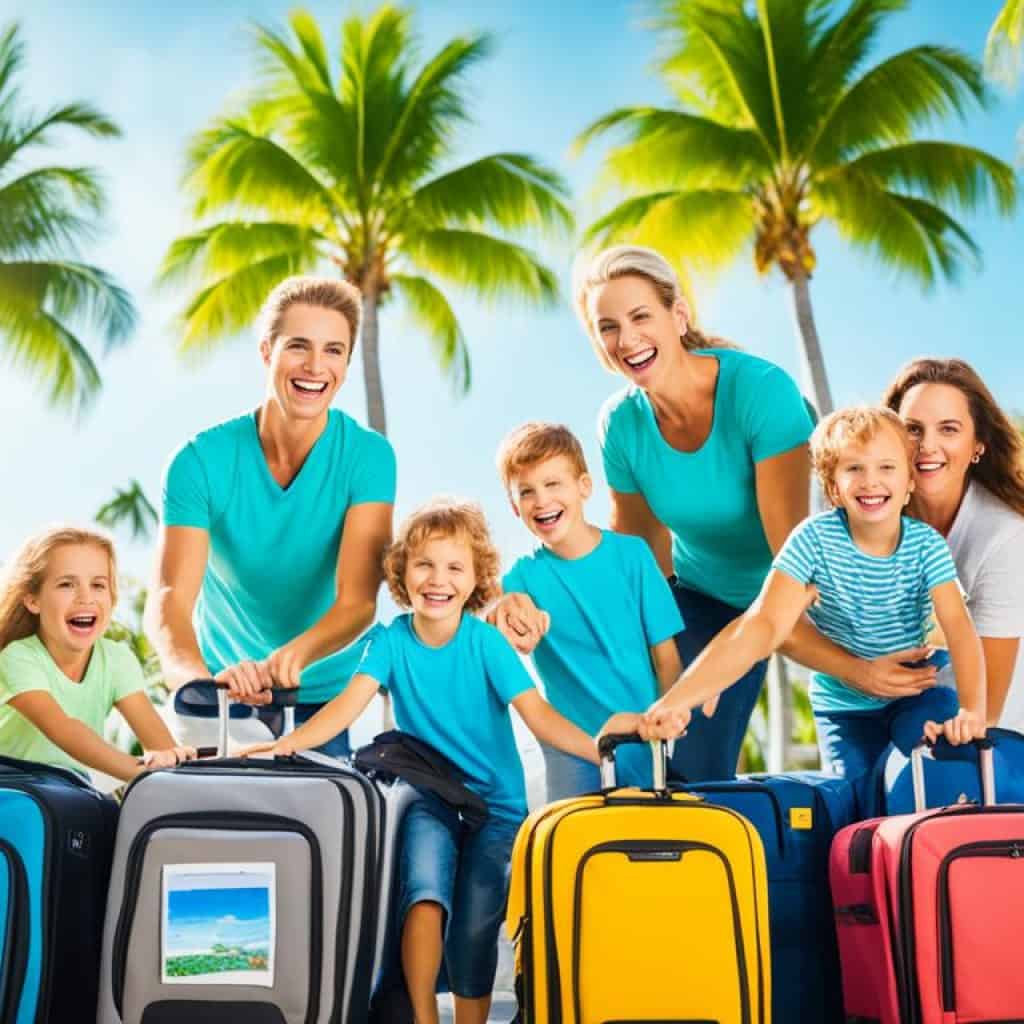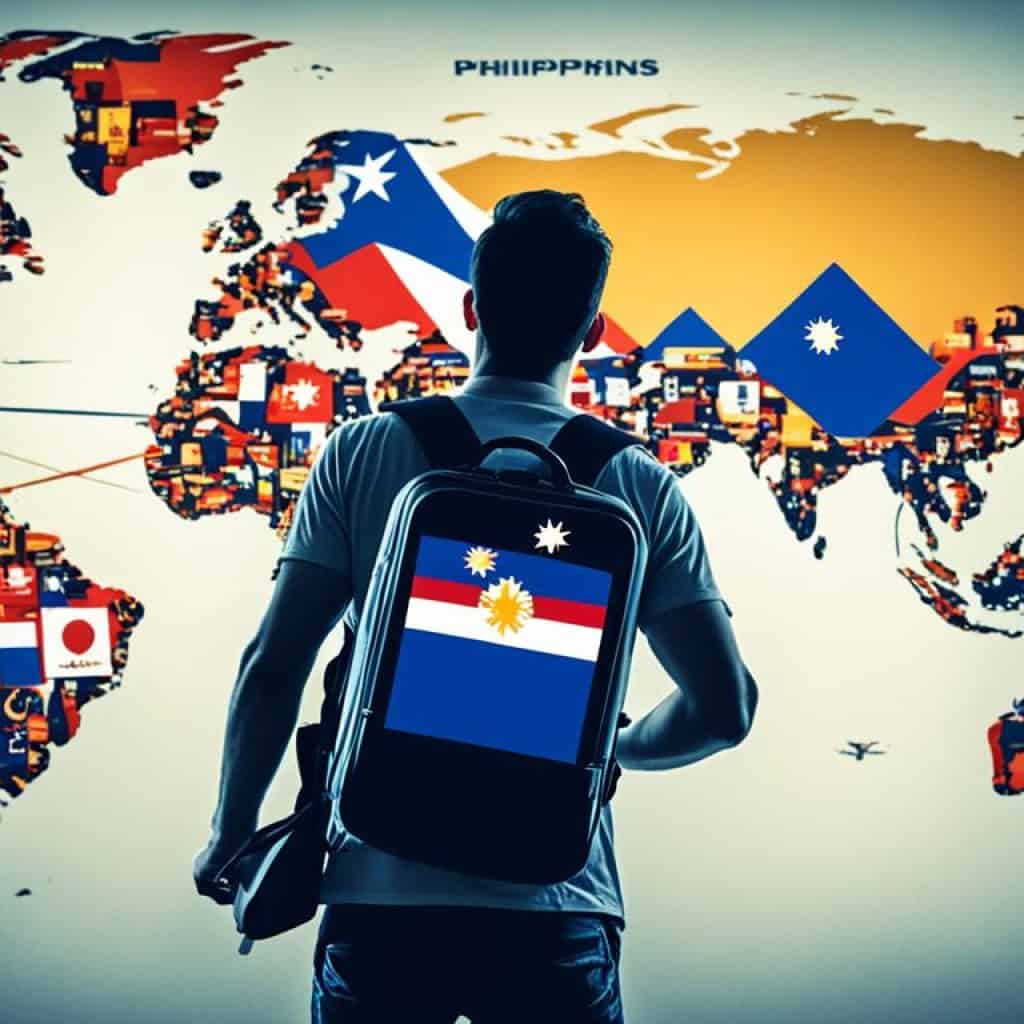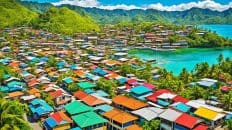Are you ready for a new adventure? Have you ever considered living as an expat in the Philippines? This tropical paradise offers a unique blend of beauty, affordability, and a welcoming expat community. Whether you’re dreaming of retiring on a white sandy beach, working in a bustling city, or immersing yourself in a vibrant culture, the Philippines has it all. Let’s dive into this comprehensive guide that will equip you with all the information you need to make your expat life in the Philippines a reality.
Key Takeaways:
- Discover the basics of living as an expat in the Philippines, from visa requirements to cost of living.
- Explore the unique culture and friendly expat community that awaits you.
- Learn about housing options, healthcare, education, and transportation in the Philippines.
- Find out how to save on relocation costs and manage your finances with Wise.
- Start your expat journey in the Philippines and embrace a new way of life in this tropical paradise.
Quick Facts about the Philippines
Explore some quick facts about the Philippines, a vibrant country with a rich culture and a warm welcome for expats.
Capital: Manila
Manila, the capital of the Philippines, is a bustling city renowned for its historical sites, modern skyscrapers, and vibrant street life.
Population: Approximately 117 million
With a population of around 117 million people, the Philippines offers a diverse and dynamic social landscape for expats to discover and embrace.
Currency: Philippine peso (PHP)
The official currency of the Philippines is the Philippine peso (PHP), which is widely accepted throughout the country. It is recommended to familiarize yourself with the current exchange rates and currency conversion options to manage your finances effectively.
Government Type: Democratic and Presidential Representative Federal Republic
The Philippines follows a democratic and presidential representative federal republic system, meaning that the country is governed by elected officials, including a president.
Religion: Christianity
Christianity is the predominant religion in the Philippines, with the majority of Filipinos being Roman Catholic. The influence of Christianity can be seen in the country’s festivals, architecture, and daily life.
Dive into the vibrant culture and friendly atmosphere of the Philippines as you embark on your expat journey.
Can a US Citizen Live in the Philippines?
Yes, US citizens can legally move to the Philippines for a long-term stay. The duration of your stay will depend on the type of visa you obtain. The Philippines offers various visa options for US nationals, including work visas, study visas, retirement visas, and visas for joining family or a spouse living in the country. It is important to ensure that you have the correct visa for your specific circumstances to avoid any legal issues during your stay.
For expats in the Philippines, obtaining the appropriate visa is crucial to ensure a smooth and legal transition. Whether you are moving to the Philippines for work, study, retirement, or to join family, there is a visa category that suits your needs. Here are some of the main visa options available to US citizens:
1. Work Visas
If you are planning on working for a Filipino company, you will need to obtain a work visa. The Philippines offers several types of work visas, including the 9(g) Pre-Arranged Employment Visa and the Special Work Permit. Each visa has specific requirements and duration of stay, so it is important to research and apply for the appropriate visa based on your employment circumstances.
2. Study Visas
For US students seeking to study in the Philippines, a student visa is required. The Student Visa (9(f)) allows students to pursue education at a recognized Philippine educational institution. It is important to apply and obtain the student visa before traveling to the Philippines to ensure compliance with immigration laws.
3. Retirement Visas
The Philippines offers a retirement visa known as the Special Resident Retiree’s Visa (SRRV) for individuals over the age of 35 who meet specific requirements. The SRRV provides long-term residency benefits for retirees, including the ability to work, study, or invest in the Philippines.
4. Joining Family or Spouse Visas
If you have a Filipino spouse or immediate family residing in the Philippines, you may be eligible for a Joining Family or Spouse Visa. These visas allow US citizens to reunite with their loved ones in the Philippines and establish legal residence.
“The Philippines offers various visa options for US nationals, including work visas, study visas, retirement visas, and visas for joining family or a spouse living in the country.”
It is important to consult with the Philippine embassy or consulate in your home country to understand the specific requirements, application process, and fees associated with each visa. Additionally, it is advisable to seek legal advice or assistance to ensure a smooth visa application and relocation process.
Remember, having the correct visa is crucial for living in the Philippines legally and enjoying a hassle-free expat life. Take the time to research and plan accordingly to make your transition to the Philippines a successful and fulfilling experience.
| Visa Type | Requirements | Duration of Stay |
|---|---|---|
| Work Visa | Letter of Employment, Alien Employment Permit (AEP) | 1 to 3 years (depending on contract) |
| Study Visa | Acceptance Letter from a recognized educational institution | Duration of study program |
| Retirement Visa (SRRV) | Proof of retirement, age of 35 or above | Indefinite |
| Joining Family or Spouse Visa | Proof of relationship with a Filipino citizen | 1 year, renewable |
Immigration and Visas in the Philippines
When considering a move to the Philippines as a US citizen, it is crucial to understand the immigration and visa options available to ensure a smooth transition. The Philippines offers a range of visa types for different purposes, allowing expats to live and work legally in the country.
Work Visas
For those planning to work for a Filipino company, the Philippines offers work visas that allow expats to legally work in the country. These visas require sponsorship by the employing company and typically have specific requirements, such as proof of employment and a verified employment contract.
Student Visas
If you are a foreign student planning to pursue your education in the Philippines, you will need a student visa. These visas are issued to foreign students studying at recognized Philippine educational institutions and require proof of enrollment and financial capacity to cover the cost of education.
Retirement Visa - Special Resident Retiree's Visa (SRRV)
The Philippines offers a retirement visa, known as the Special Resident Retiree’s Visa (SRRV), for individuals over the age of 35 who wish to retire in the Philippines. This visa requires meeting specific financial requirements, such as depositing a specific amount in a Philippine bank account or purchasing a property in the country.
Spouse Visas and Quota Visas
In addition to work and retirement visas, the Philippines also offers spouse visas for foreign nationals married to Filipinos. These visas allow expats to legally reside and work in the country. Quota visas are available for individuals with exceptional skills or qualifications that can contribute to the development of the Philippines, such as investors and entrepreneurs.
Before applying for any visa, it is essential to understand the documentation requirements, fees, and processes associated with each visa type. Consulting with an immigration lawyer or the Philippine embassy or consulate can provide valuable guidance throughout the visa application process.
Living in the Philippines: The Basics
Moving to a new country requires some adjustment, and living in the Philippines is no exception. This section will provide information on the cost of living, housing options, healthcare, banking, taxation, and education in the Philippines. Understanding these basics will help prepare you for a smooth transition and an enjoyable expat life in the Philippines.
Cost of Living
One of the advantages of living in the Philippines as an expat is the affordable cost of living. Compared to the US, everyday expenses such as meals, groceries, and transportation are generally more affordable in the Philippines. For instance, a three-course meal for two people can cost around $21.52, and the monthly public transport pass is approximately $10.14. It’s important to note that prices may vary depending on your location and lifestyle.
Housing Options
When it comes to housing, expats in the Philippines have a range of options to choose from. Many expats prefer to rent before committing to buying a property, as it allows for flexibility and time to explore different areas. Rental prices are generally lower compared to the US, and you can find affordable options in both urban and rural areas. Alternatively, buying a property in the Philippines is also a viable option, with significantly more affordable prices compared to the US. Take the time to research different areas and consider your personal preferences when deciding on housing.
Healthcare
The healthcare system in the Philippines has its challenges, with the public healthcare system often lacking resources and quality of care. Many expats opt for private health insurance to access higher quality and more affordable healthcare services. It’s crucial to research and obtain comprehensive health insurance coverage before moving to the Philippines to ensure you have access to the healthcare services you may need.
Banking and Taxation
Opening a local bank account is essential for managing your finances in the Philippines. Major banks in cities like Manila and Cebu allow US citizens to open accounts either in person or online. ATMs are widely available in cities, although fees may apply. It’s important to familiarize yourself with the local banking system and any taxation requirements to ensure compliance with Philippine laws and regulations.
Education
The education system in the Philippines follows the American model, making it easier for US students to adapt. There are both public and private schools available, with English being widely spoken as the medium of instruction. International schools are also present in major cities like Manila. Before relocating to the Philippines, it’s crucial to research and consider the education options available for your children.
Table: Comparison of Cost of Living in the Philippines and the US (Sample Data)
“Living in the Philippines offers expats an opportunity to embrace a more affordable lifestyle without compromising on quality. From housing options and healthcare to banking and education, the basics are covered for a smooth and enjoyable expat life in this tropical paradise”.
Cost of Living in the Philippines
When considering a move to the Philippines, it’s important to understand the cost of living to plan your budget effectively. The good news is that the cost of living in the Philippines is generally lower compared to the US, making it an attractive option for expats.
Prices can vary depending on your location and lifestyle, but everyday expenses such as meals, groceries, and transportation are typically more affordable in the Philippines. For example, a three-course meal for two people can cost around $21.52, allowing you to indulge in delicious local cuisine without breaking the bank.
The cost of living in the Philippines is generally lower compared to the US.
Transportation costs in the Philippines are also relatively low, offering convenient options for getting around. The monthly public transport pass, for instance, is around $10.14, providing affordable access to buses, jeepneys, and trains.
One significant expense to consider is housing. Rent for a one-bedroom apartment in a city center can range from $324.40 to $108.13, depending on the location. It’s important to research different areas and consider your personal preferences and budget when choosing accommodation in the Philippines.
Cost of Living Highlights:
These cost of living highlights give you an idea of the affordability and value for money you can expect living in the Philippines. Plus, you’ll have the opportunity to enjoy the vibrant culture, beautiful landscapes, and warm hospitality the country has to offer.
In the next section, we’ll explore the costs involved in moving to the Philippines, ensuring you have a comprehensive understanding of the financial aspects associated with international relocation.
Cost of Living Comparison
Cost of Moving to the Philippines
Moving to the Philippines is an exciting adventure, but it’s important to be aware of the costs involved. As an expat, you’ll need to factor in expenses such as shipping your belongings and arranging flights for yourself and your family. Shipping a full container from the US to the Philippines can range from $850 to $4,500, depending on the size and destination.
To ensure you’re getting the best deal, it’s recommended to request quotes from multiple shipping companies. This way, you can compare prices and choose the option that suits your budget and needs. Keep in mind that shipping costs may vary based on factors such as the volume of your belongings, shipping distance, and any additional services you require.
When planning your move, don’t forget to consider the expenses associated with bringing pets to the Philippines. There are specific requirements and processes for pet importation, including vaccinations, health certificates, and quarantine periods. These costs can add up, so it’s important to budget accordingly and ensure compliance with the Philippine regulations for pet entry.
By understanding the costs involved and planning ahead, you can make your relocation to the Philippines a smoother and more financially manageable experience.

An image illustrating the excitement of moving to the Philippines as an expat.
Housing in the Philippines
When it comes to finding a place to live in the Philippines, expats have several options to consider. Whether you prefer the flexibility of renting or the long-term investment of buying a property, the Philippines offers affordable housing solutions to suit different budgets and preferences.
Renting in the Philippines
Renting is a popular choice among expats in the Philippines due to its flexibility and the opportunity to explore different areas before committing to a long-term investment. Rental prices in the country are generally lower compared to the US, making it more affordable for expats to find suitable accommodations.
Whether you’re looking for an apartment in the bustling city center or a house in a peaceful suburban neighborhood, there are plenty of rental options available in both urban and rural areas. The cost of rent will vary depending on the location, size, and condition of the property, giving you the freedom to choose according to your budget and lifestyle preferences.
It is advisable to research different neighborhoods and consider factors such as proximity to amenities, transportation options, and safety when choosing a rental property. Working with a reputable real estate agent can also help streamline the process and ensure you find the best housing option to meet your needs.
Buying a Property in the Philippines
Whether you’re interested in a condominium unit, a townhouse, or a single-family house, there is a wide range of properties available for sale across the country. It is recommended to work with a licensed real estate broker or agent who can guide you through the buying process and help you find properties that meet your criteria.
Before making a purchase, it’s essential to conduct thorough research on the real estate market and understand the legal requirements and regulations for foreigners buying property in the Philippines. This will ensure a smooth and successful transaction, giving you peace of mind in your new home.
Average Housing Prices in the Philippines (2022)
The prices mentioned above are approximate estimates and may vary depending on factors such as location, property type, and market conditions. It’s always recommended to consult with local real estate professionals for the most up-to-date information on housing prices in your desired area.
Healthcare in the Philippines
The healthcare system in the Philippines presents certain challenges, with the public healthcare system often lacking in resources and quality of care. As an expat in the Philippines, it is important to understand your healthcare options and plan accordingly to ensure you have access to the necessary medical services.
Before moving to the Philippines, it is crucial to research and obtain comprehensive health insurance coverage that suits your needs. Look for insurance plans that provide coverage for hospitalization, outpatient consultations, medications, and emergency medical services.
Having adequate health insurance coverage will give you peace of mind and ensure that you can receive the medical care you may need during your time in the Philippines. Additionally, it is advisable to familiarize yourself with the hospitals and medical facilities in your area to know where to go in case of emergencies.
Private vs. Public Healthcare
In the Philippines, the private healthcare sector generally offers better quality care and a wider range of medical services compared to the public healthcare system. Private hospitals often have modern facilities, well-trained medical staff, and more advanced medical equipment.
On the other hand, the public healthcare system is often burdened with overcrowded hospitals, long waiting times, and limited resources. While public healthcare is available and can provide basic medical services, it may not always meet the standards or expectations of expats.
Private healthcare facilities and doctors typically charge higher fees compared to their public counterparts. However, the cost of private healthcare in the Philippines is still relatively affordable compared to many Western countries.
Medical Facilities for Expats
Major cities in the Philippines, such as Manila and Cebu, have reputable private hospitals and medical facilities that cater to expats. These hospitals are well-equipped and staffed by English-speaking doctors and medical professionals who are accustomed to working with international patients.
Some of the top private hospitals for expats in the Philippines include:
- St. Luke’s Medical Center – Quezon City
- Makati Medical Center
- The Medical City – Ortigas
- Asian Hospital and Medical Center – Alabang
- Chong Hua Hospital – Cebu City
These hospitals offer a wide range of medical specialties and services, including emergency care, surgeries, diagnostic tests, and specialized treatments.
Pharmacies and Medications
Pharmacies in the Philippines are abundant and easily accessible, with both local and international chain pharmacies operating throughout the country. Expats can easily find and purchase prescription medications, over-the-counter drugs, and other medical supplies.
Major pharmacy chains in the Philippines include Mercury Drug, South Star Drug, and The Generics Pharmacy. These pharmacies offer a wide range of medications at affordable prices. Most medications do not require a prescription, but it is always recommended to consult with a doctor or pharmacist before purchasing any medication.
When living in the Philippines, it is important to ensure that you have an adequate supply of any essential medications you may need. In case your prescribed medications are not available locally, you may need to consider alternative options, such as having them shipped from your home country or consulting with a local doctor for suitable alternatives.
Maintaining Your Health in the Philippines
Living in the Philippines offers several opportunities for a healthy lifestyle. The tropical climate, vibrant local produce, and outdoor activities make it easier to maintain an active and balanced lifestyle.
Here are some tips for staying healthy in the Philippines:
- Eat a balanced diet: Take advantage of the fresh fruits, vegetables, and seafood that the Philippines has to offer. Incorporate local dishes and healthy ingredients into your meals.
- Stay hydrated: The hot and humid climate in the Philippines requires proper hydration. Drink plenty of water and avoid excessive consumption of sugary beverages.
- Protect yourself from the sun: Apply sunscreen, wear hats, and use umbrellas or parasols to protect yourself from the sun’s harmful rays.
- Maintain an active lifestyle: Engage in regular physical activities such as walking, swimming, or joining local fitness classes.
- Practice good hygiene: Wash your hands regularly, especially before meals, and maintain proper personal hygiene to prevent the spread of diseases.
- Stay up to date with vaccinations: Consult with a healthcare professional to ensure you have the necessary vaccinations for living in the Philippines.
By taking care of your health and being proactive in seeking medical care when needed, you can enjoy a fulfilling expat life in the Philippines.
Banking and Taxation in the Philippines
When relocating to the Philippines, one of the most important aspects to consider is managing your finances. Opening a local bank account is essential for seamless transactions and easy access to your funds. Fortunately, major banks in cities like Manila and Cebu offer convenient options for US citizens to open accounts either in person or through online applications.
Having a local bank account provides various benefits, including:
- Convenient access to banking services
- Easy transactions and bill payments
- Local currency withdrawals
- Online banking and mobile app services
In addition to traditional banking services, ATMs are widely available in cities throughout the Philippines, making it easy to withdraw money and handle day-to-day expenses. However, it’s important to note that some ATMs may charge fees, so it’s advisable to check with your bank to understand any applicable charges.
Taxation in the Philippines

The Philippine taxation system is an essential aspect for expats to understand when living in the country. Here are some key points to consider:
| Tax Type | Description |
|---|---|
| Income Tax | Expats living and working in the Philippines are subject to income tax on their earnings in the country. The tax rate varies based on income brackets, with rates ranging from 5% to 35%. It’s important to comply with the local tax regulations and file your tax returns accordingly. |
| Value Added Tax (VAT) | The Philippines imposes a 12% value-added tax on the sale of goods and services. Some goods and services are exempted from VAT, while others may be subject to a reduced rate of 0% or 3%. It’s essential to understand VAT requirements, especially for businesses operating in the country. |
| Property Tax | Owners of real property in the Philippines are required to pay an annual real property tax. The tax rate is determined by the local government unit where the property is located and is based on the assessed value of the property. |
| Capital Gains Tax | When selling real property in the Philippines, a capital gains tax may apply. The tax rate is generally 6% of the selling price or fair market value, whichever is higher. |
Taxation in the Philippines can be complex, and it’s essential to seek professional advice to ensure compliance with the local tax laws. Consulting with a tax advisor or accountant specializing in Philippine taxation can help you navigate the system and make informed financial decisions.
By understanding the local banking system and taxation requirements in the Philippines, expats can effectively manage their finances and comply with the necessary regulations. Building a strong financial foundation will contribute to a smooth and enjoyable expat experience in this vibrant country.
Education in the Philippines
The education system in the Philippines is well-suited for expats, especially those from the US. Based on the American model, it offers a familiar structure, making it easier for US students to adjust and thrive. Whether you prefer public or private schools, there are plenty of options to choose from, ensuring that you find the right fit for your child’s educational journey.
Public Schools
Public schools in the Philippines provide education to a large portion of the population. While they may vary in quality depending on the location, many public schools are striving to provide accessible and quality education. English is widely spoken and used as the medium of instruction, which can be an advantage for expat students.
Private Schools
Private schools in the Philippines offer a wide range of educational approaches and curricula. These schools often provide a more diverse range of programs and extracurricular activities, catering to the specific needs and interests of students. Private schools generally have smaller class sizes, allowing for more personalized attention and support.
International Schools
For expat families seeking an education that aligns with an international curriculum, there are several international schools available in major cities like Manila. These schools offer internationally recognized programs such as the International Baccalaureate (IB) or the American curriculum. International schools often provide a diverse multicultural environment and a global perspective on education.
Did You Know? In the Philippines, international schools can be a popular choice among expat families because they offer a seamless transition for students who may only be in the country temporarily. Additionally, international schools often provide a wider variety of extracurricular activities and resources for students.
Home Schooling
Home schooling is another option for expat families in the Philippines. It allows for a more flexible and personalized approach to education. With home schooling, parents have the freedom to tailor the curriculum to their child’s individual needs and interests. However, it is important to familiarize yourself with the legal requirements and regulations for home schooling in the Philippines.
Higher Education
The Philippines has a robust higher education system, with numerous universities and colleges offering a wide range of programs. Many institutions have a strong reputation for excellence in fields such as engineering, medicine, tourism, and business. If you are considering pursuing higher education for yourself or your children in the Philippines, it is advisable to research the different institutions and programs available.
Whether you choose public, private, or international schools, the Philippines offers a diverse and enriching educational experience. By carefully considering your options and taking into account your child’s needs, you can ensure that they receive a quality education while living in the Philippines.
| Educational Options | Key Features |
|---|---|
| Public Schools | – Widely available and accessible to all – English as the medium of instruction – Varying quality based on the location |
| Private Schools | – More diverse range of programs and extracurricular activities – Smaller class sizes for personalized attention – Greater emphasis on quality education |
| International Schools | – Curricula based on international standards (e.g., IB, American) – Multicultural environment with global perspective – Seamless transition for expat families |
| Home Schooling | – Flexible and personalized approach to education – Tailored curriculum to meet individual needs – Compliance with legal requirements and regulations |
| Higher Education | – Numerous universities and colleges – Strong reputation in various fields – Research and choose the right institution and program |
Getting Around in the Philippines
When it comes to getting around in the Philippines, there are several public transport options to choose from. Whether you’re exploring the bustling streets of Manila or venturing to remote islands, understanding the transportation system is key to navigating this vibrant country.
In major cities like Manila, you’ll find a variety of affordable public transportation options. Buses, jeepneys (converted military Jeeps), trains, and ferries are popular choices for both locals and expats. These modes of transportation offer a budget-friendly way to move around the city and experience the rich culture of the Philippines.
“The Philippines has a colorful and unique mode of transportation called jeepneys. These flamboyantly decorated vehicles are an iconic symbol of Filipino culture.” – Local transportation enthusiast
While public transportation is convenient, it’s essential to be cautious and aware of potential scams. Some taxis may try to overcharge foreigners, so it’s wise to agree on a fare or ensure they use a meter. Alternatively, you can use ride-hailing apps like Grab for a more convenient and reliable option.
Transportation Tips for New Expats
- Research the specific transportation options available in your location to plan your daily commute or travels effectively.
- Be cautious of potential scams when using taxis, particularly in touristy areas.
- Consider using ride-hailing apps for a more convenient and safer transportation experience.
- If traveling between islands, check the schedules and book domestic flights or ferries in advance.
- Get familiar with the local transportation etiquette, such as giving way to elders or offering seats to pregnant women.
Exploring the Philippines is an adventure in itself, and the transportation system allows you to discover the country’s hidden gems. Whether you opt for the affordable public transportation options, reliable ride-hailing apps, or convenient domestic flights, getting around in the Philippines will ensure you make the most of your expat experience.
Save on Relocation Costs and Currency Exchange
Relocating to the Philippines as an expat can be an exciting yet costly endeavor. Fortunately, Wise offers a convenient and low-cost solution to manage your relocation expenses and currency exchange needs. With Wise, you can save on international transfer fees and unfavorable exchange rates, ensuring you get the most out of your hard-earned money during the relocation process.

The Wise Account is a game-changer for expats moving to the Philippines. It allows you to hold and exchange multiple currencies, including the Philippine peso. This means you can easily convert your funds into Philippine pesos without incurring excessive fees or unfavorable exchange rates. By having a Wise Account, you can conveniently spend like a local and avoid unnecessary costs.
Additionally, with the Wise card, you can make payments in Philippine pesos without incurring extra fees. Whether you’re shopping for groceries, dining out at local establishments, or paying bills, the Wise card ensures that you can seamlessly transact in the local currency, saving you money on foreign transaction fees.
By using Wise, you have greater control over your finances, making your relocation to the Philippines smoother and more cost-effective. You can trust Wise to provide a secure and efficient platform for managing your relocation expenses and currency exchange needs, allowing you to focus on settling into your new life as an expat in the Philippines.
Conclusion
Moving to the Philippines as an expat offers a unique opportunity to embrace a different way of life in a tropical paradise. The country’s stunning landscapes, vibrant culture, and warm-hearted locals create an inviting environment for expats seeking a fulfilling experience. To ensure a smooth transition, it is essential to familiarize yourself with key aspects of living in the Philippines.
Understanding the visa requirements, cost of living, housing options, healthcare, and transportation will empower you to make well-informed decisions. Whether you are relocating for work, retirement, or personal reasons, the Philippines provides a welcoming and diverse environment tailored to the needs and preferences of every expat.
By conducting thorough research and proper planning, you can embark on your expat journey with confidence. Embrace the opportunity to immerse yourself in the rich Philippine culture, connect with the expat community, and explore the wonders this beautiful country has to offer. Life as an expat in the Philippines awaits, and it is sure to be a rewarding and unforgettable experience.
FAQ
Can a US citizen legally move to the Philippines?
What types of visas are available for US citizens in the Philippines?
US citizens can choose from several visa types for living in the Philippines, including work visas, study visas, retirement visas, and visas for joining family or a spouse living in the country. It is important to ensure that you have the correct visa for your specific circumstances to avoid any legal issues during your stay.
What is the cost of living in the Philippines compared to the US?
The cost of living in the Philippines is generally lower compared to the US. While prices can vary depending on your location and lifestyle, everyday expenses such as meals, groceries, and transportation are typically more affordable in the Philippines.
What are the housing options for expats in the Philippines?
Renting is a popular option for expats in the Philippines, as it allows for flexibility and time to explore different areas before committing to buying a property. Rental prices in the Philippines are generally lower compared to the US, with affordable options available in both urban and rural areas. Buying a property is also a viable option, with prices being significantly more affordable compared to the US.
What is the healthcare system like in the Philippines?
The healthcare system in the Philippines has its challenges, with the public healthcare system often lacking in resources and quality of care. For this reason, many expats choose to have private health insurance to access higher quality and more affordable healthcare services. It is recommended to research and obtain comprehensive health insurance coverage before moving to the Philippines to ensure you have access to the healthcare services you may need.
Can US citizens open a bank account in the Philippines?
Yes, US citizens can open a local bank account in the Philippines. Most major banks in cities like Manila and Cebu allow US citizens to open accounts either in person or through online applications. It is important to familiarize yourself with the local banking system and any taxation requirements to ensure compliance with Philippine laws and regulations.
What are the education options for expat children in the Philippines?
The education system in the Philippines is mainly based on the American model, making it easier for US students to adjust. There are both public and private schools available, and English is widely spoken and used as the medium of instruction. International schools are also present in major cities like Manila. Before relocating to the Philippines, it is important to research and consider the education options available for your children.
How is transportation in the Philippines?
Public transport options in the Philippines include buses, jeepneys, trains, and ferries. Major cities like Manila have various options for cheap public transportation, although service quality can vary. Taxis and ride-hailing apps are also common, but it is important to be cautious and aware of potential scams. Domestic flights and ferries are available for traveling between the islands.
How can I save on relocation costs and currency exchange?
Wise offers a convenient and low-cost way to manage your relocation expenses and currency exchange needs. With Wise, you can save on international transfer fees and exchange rates, making it easier to manage your finances during the relocation process. The Wise Account allows you to hold and exchange multiple currencies, including Philippine peso, making it convenient to spend like a local once you arrive in the Philippines. Additionally, the Wise card allows you to make payments in Philippine peso without incurring extra fees.


















Add comment